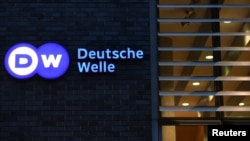Turkey’s media regulator ordered Friday the German public broadcaster Deutsche Welle, or DW, to obtain a broadcast license for its Turkish-language website.
The Radio and Television Supreme Council (RTUK) ruled on the move in a majority vote, saying the German broadcaster must comply with a Turkish licensing regulation enforced in 2019.
RTUK has previously moved to block DW’s content in 32 languages under its dw.com domain, along with VOA Turkish over the refusal by both media outlets to obtain a license.
Both international broadcasters said previously they could not comply with the regulation because of censorship concerns.
Since that initial ban in 2022, DW’s Turkish Service has used dwturkce.com and inspiredminds.de to deliver news to audiences inside Turkey.
Tuncay Keser, an RTUK member appointed to the board by the opposition Republican People's Party, announced that the regulator will give DW three days to apply for a broadcast license.
Failure to comply will result in RTUK's request that a court block access inside the country to DW’s domain name, Keser said.
RTUK announced the three-day notice for DW on its website on Friday.
Erkan Arikan, who heads the DW Turkish language service, has said the broadcaster will continue to deliver news to audiences in Turkey.
“With our existing resources, we will continue to deliver the developments in the world, Europe, Germany and Turkey from different perspectives and with background information to our readers and viewers on different platforms, as always,” DW Turkish cited Arikan as saying.
The broadcaster has a pending case at Turkey’s Constitutional Court that argues that the ban imposed in 2022 “violated rights to freedom of expression, press, a fair trial and an effective remedy.”
Legal tensions
Carla Hagemann, DW’s corporate spokesperson, told VOA the legal requirements for obtaining a broadcast license in Turkey include establishing a company that is “50 percent owned by a Turkish citizen.”
“The responsibility for programs must be transferred to this person,” she said.
But, said Hagemann, that requirement is incompatible with German law, which puts overall responsibility for DW with its director-general. That power, she said, “may not be transferred to an external party.”
The licensing could enable Turkey to censor content, she added.
DW is governed by the Deutsche Welle Act, which defines the broadcaster's programming, structure and financing.
According to the act, the director-general must manage the broadcaster independently and is “solely responsible for the preparation and planning of programs and for the operating of the corporation as a whole.”
Responding to an inquiry, RTUK directed VOA to fill out a form providing personal information such as address and identity card number.
But in July 2022, when it first imposed bans on DW and VOA, RTUK said that if the outlets had complied, "blocking their websites by the independent judiciary would not have been applied."
"RTUK supports pluralism, free press and free reporting by media outlets. However, like every democratic country, Turkey is a state with the rule of law. RTUK, which is a guide to the sector, is in favor of the legal dissemination of news content under certain guarantees," the regulator added.
Censorship concerns
In 2022, RTUK issued 54 penalties to five independent broadcasters but only four penalties to pro-government channels, according to the European Federation of Journalists.
Several press freedom advocates in Turkey view the licensing requirement for international broadcasters as a tool for censorship.
“The main purpose of RTUK is to end, prevent and intimidate broadcasts that the [Turkish] government does not like. DW and VOA were among the broadcasts that the government did not like,” Faruk Bildirici, a media ombudsman and former RTUK member, told VOA.
Gurkan Ozturan, coordinator of the Media Freedom Rapid Response at Leipzig-based European Center for Press and Media Freedom, told VOA, “RTUK has long been acting like an apparatus of the government, targeting independent media, which poses a great threat against media pluralism in the country.”
Ozturan added that the demand that Deutsche Welle obtain a license “seems far from being well-intentioned, when we look at the track record of RTUK's activities in recent years, issuing fines against independent media, making statements that threaten and endanger journalists.”
RTUK’s vote came on the same day the European Commission released its annual report on Turkey’s EU accession process.
The report criticized the state of freedom of expression and press in Turkey and listed the violations this year, including the ban on VOA Turkish’s website in August.
It also noted that Turkish authorities declined to extend the operating license of DW’s office in Turkey.
VOA Turkish contributed to this report.





